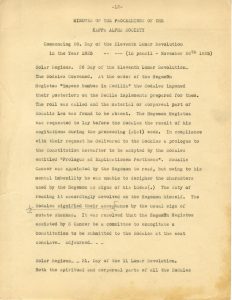“Actually, this is for me:” Noname on self-care & disillusionment
September 20, 2018
“A think piece in the rap song, the new age covenant,” Noname conjectures ironically in “Blaxploitation,” the second track off her self-released Room 25, out September 14.
The Chicago-born rapper’s second album is full of what made her 2016 debut Telefone a cult favorite on the alternative rap scene: lyrical dexterity coupled with organic storytelling, made unforgettable by her signature silky-but-earnest voice.
On Room 25, Noname’s gentle flurry of brutal honesty is back, this time to wax poetic on self-development in a postanalog world. Where is home, exactly?
Clean vocal energy backed by production suggesting film nostalgia with a crooked twist indicates that while Noname doesn’t know the answer quite yet, she’s eager to share what she’s learned so far.
It’s the world’s most compelling journal entry, with verses jumping expertly from sentimentality to politics, from disillusionment to reclamation — a frenzy representative of Noname’s ever-running mind.
On the surface the album is redemptive, but at its core, Room 25 pushes for catharsis with an eye towards perpetual personal growth.
The opening track “Self” establishes explicit borders for the 34-minute odyssey. It begins with a repeated fourchord progression typical of jazz music and a menagerie of well-placed rhymes.
Suddenly, she pauses and asks, “Y’all really thought a b– — couldn’t rap, huh? Maybe this your answer for that.”
She then begins to weave substance into a confident beginning, name-dropping Ronald Reagan and the popular theory that he was at least in part responsible for the crack cocaine epidemic among low-income black communities in the late 20th century.
She then immediately cuts short her theorizing to say simply, “Nah, actually, this is for me.”
This statement functions as an abstract for the album — whatever she may tell us going forward, she wants us to take it in the context of her individual journey rather than raising it up as an activist anthem.
Like her contemporary SZA’s 2017 album Ctrl, this album intends to focus on the hyper-specific experiences of one woman which by the end will somehow feel universal.
Noname is no stranger to the cleansing power of the spoken word — she got her start in 2010 performing slam poetry and rapping on what FADER Magazine calls the “poetry-adjacent Chicago rap scene.”
Origins are a strong force on Room 25, both in lyrical references to Chicago’s South Side and in general poetic spirit.
Noname’s preferred genre of poetry seems to be that which deals heavily in personal testimony for personal benefit.
In FADER’s pre-album release interview with the young rapper, she tells them, “I’m not trying to be the anti-something or pro-something else… [m]aybe this project will show some of those people who think that I am this very, like, conscious female rapper that I’m just as regular and normal as everybody.”
However, the album’s second track “Blaxploitation” reveals that it may be impossible to remain apolitical when there’s so much at stake.
“I’m struggling to simmer down, maybe I’m an insomniblack / Bad sleep triggered by bad government,” she confesses.
“Put a think piece in the rap song, the new age covenant / If you really think I’m cooking crack, then pass me the oven mitts.”
This last line has somewhat of a double meaning. Noname dares critics who claim she’s too preachy to confront her directly.
On another level, she’s referencing the 1970s film genre called “Blaxploitation,” for which the song is named. Films of the genre shamelessly portrayed stereotypes of black people. However, over time they were reclaimed by activists, who reseized this means by which black-centric stories could be told. The genre serves as a symbol for the twisted modes of reposession necessitated by the dysfunction of a “post-racial” society. Aside from but connected
to the Blaxploitation framework in Room 25 is the co-opting of minstrelsy staples like “jive talk” and musical score.
For instance, the instrumental profile of “Self” is reminiscent of midcentury jazz lounge arrangements — subtle piano, jazz guitar and soft doo-wops make clear the reference to foms of entertainment pioneered by black people.
“Blaxploitation” has an accompaniment straight out of Tom and Jerry: anxious and decidedly vintage. In “Window,” album producer Phoelix’s use of strings and chimes transports listeners to an old-school Disney movie they can’t quite name, where the characters wear white gloves and speak in an exaggerated dialect.
Sound familiar? Minstrelsy’s shadow can be seen in Looney Tunes, Mickey Mouse, Betty Boop and Dumbo, though practically all animation inadvertently retains these uncomfortable traces.
None of this is a stretch when a closer look is taken at the lyrics of various songs on Room 25.
In “Blaxploitation,” Noname delivers some of the most pointed verses of the album. “Penny Proud… pissing off betty the boop / Traded my life for cartoon / Dance, monkey, dance” draws a connection between early-aughts cartoon favorite The Proud Family and minstrelsy, suggesting that today’s push for diversity may yield a successful reversal of the venomous traditions of the past.
The next verse employs what very well may be “jive talk,” a form of slang associated with mid-century black jazz musicians and frequently appropriated for minstrel shows.
“When we cool, they cool, we die, it’s coon / We supa fly indigenous, now hop to the moon / Who brought the movie to America? It’s still coming soon,” she says, fully expressing her disillusionment with public history and its insistence on nostalgic amnesty.
Finally, in “Window,” the track with the most obvious Old Hollywood flair, she snaps, “This song ain’t even about you, Daffy Duck,” reinforcing the reclamation of the style and preparing listeners for more personal content, as unbranded as can be by the oppressive innocence of the past.
The most sentimental snippets on Room 25 come by way of the penultimate track “With You.”
Noname displays a sort of unrestrained dignity. “You,” she laments, “Gave you a taste of my redemption and now I want my drink back / Somebody hold me like I’m almost enough.”
One would expect an empowering conclusion to the album, yet Noname knows that real life’s loose ends don’t tie up so neatly.
Even after growth, people can’t help but remain wistful: “So you really don’t think about me? And you really don’t miss me? Everything is everything, just know that I love you,” invoking Lauryn Hill’s prochange hit to suggest that while she has moved on and rebuilt, she holds onto a softness from long ago, and that just might be alright.
All of Noname’s vulnerable moments are also followed by a punchy comeback or a wake-up call.
Introspective verses in “Window” are interrupted by a chorus sung by Phoelix: “Quit looking out the window, go find yourself / Come get the bag with your kinfolk, don’t doubt your wealth.”
Self-reflection is crucial only when it’s balaced. Sitting inside ruminating, whether on heartbreak or politics, is unproductive.
Ready-made radio hit “Ace” touches on perseverance as a principle: “I do not fall to no pressure / … I just raise the bar, I look at it with a measure.”
Honorable mentions for album highlights include “Montego Bae,” which chronicles the wanderlust of overworked women waiting to live out Stella Got Her Groove Back, features a Jamaican instrumental setup but uses the jazz lounge piano of “Window,” possibly to emphasize that the fever dream described by the lyrics is just that.
Also, the singular verse of “Regal” delivers some of the cleverest lyrics on the album: “Africa’s never dead, Africa’s always dying / No more apples or oranges, only pickles and pacifists / Twitter ranting for martyrdom unified as capitalists / Give ’em death be gone, give ’em Teflon Do / Give ’em Rice-A-Roni politics to bear more arms / And watch the bears come out…”
The most stirring feature of Noname’s music is that it initially appears light, happy even, until she strikes a soft blow like the one above, which takes you by surprise and raises the hairs on your arms — but only if you’re listening closely.
The conclusion of Room 25 is a song titled “no name.” It does not blend the previous songs together, but rather picks a bouquet from their overtones, adding some new observations in the process.
The words range from postindustrial
— “Medicine’s overtaxed, no name look like you / No name for private corporations to send emails to” —to classically poetic — “I sewed the answers in linen, dance ’em under the thread.”
The unsettling that’s-allfolks whimsy of the beginning tracks is replaced by gentle piano and a simple snare drum.
Noname has found her sound, and with it, a cause for celebration. Thus “no name” is a waltz, lovingly dedicated to quirks, altruism, Chicago and morning sunlight.
Room 25 is a lesson in purification for its own sake, open to all.
Before Adam Ness and Yaw enter with a true crooners’ outro, Noname utters her last words on the album over a sustained violin note: “When we walk into heaven, nobody’s name gon’ exist / Just boundless movement for joy, nakedness radiates…”






